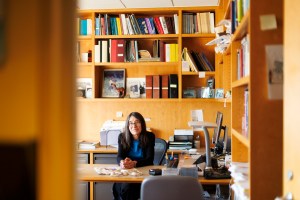Making a sustained impact
Report catalogs Harvard’s progress in creating a far greener campus
Climate change and environmental sustainability are widely recognized as two of the most pressing problems facing the world. How has Harvard responded to these global challenges?
A sustainability impact report released today provides for the first time a University-wide snapshot of the progress that has been made by students, staff, and faculty to reduce the environmental footprint and increase the operational efficiency of Harvard’s campus.
“Every member of the Harvard community has contributed to our progress, and, as always, I am proud of the creativity and commitment I see on our campus every day,” said President Drew Faust in an email message announcing the report’s release. “We must continue to work together as a university to develop new approaches and solutions that will make a positive difference at Harvard and in the wider world.”
The online report includes interactive graphs and infographics displaying a variety of data, including information on greenhouse gas emissions, transportation, water, and waste covering all of Harvard’s Schools and administrative units. The report was also designed as a learning tool to provide visitors with solutions, case studies, and lessons that can be applied to change habits and practices. A timeline allows visitors to explore videos and pictures of the milestones reached and the creative ideas that have been developed by teams throughout the University. Messages from prominent faculty and student leaders, along with the motto “Don’t Just Learn It, Live It,” challenge the community to continue making progress.
“We are focused on pushing ourselves to dig deeper and broader to develop replicable models for change that are cost-effective and provide environmental benefit,” said Heather Henriksen, director of the Office for Sustainability. “Sustainability at Harvard is about shifting the culture of an institution and inspiring the next generation of environmental leaders.”
Sustainability initiatives across campus seek to align individuals and policies at every University level with a clear and aggressive sustainability vision and goals. As a result, greenhouse gas emissions have been reduced 16 percent in fiscal 2012 from the fiscal 2006 baseline, including 3 million square feet of growth, through an aggressive energy-reduction strategy focused on improving the efficiency of on-campus utilities, energy audits, life-cycle costing, green building standards, and implementation of more than 1,000 energy-efficiency measures that will save an estimated $9 million annually. Energy reduction and greenhouse gas reduction projects have also been integrated into the University’s five-year capital planning process so that future energy use, greenhouse gas emissions, and costs are factored into long-term planning.
Students have been at the heart of Harvard’s sustainability efforts, often acting as the catalysts for continued change and progress.
“The opportunity to participate in University-wide sustainability initiatives provides students with an active voice and a role in decision-making, and allows them to put into practice what they have studied,” said Danny Wilson ’14, co-chair of the Environmental Action Committee and co-chair of the Council of Student Sustainability Leaders. “As an institution, we have a commitment to local and global communities. But we must also be a role model for others.”
The report shows that the University’s commitment to sustainability goes well beyond climate change. From certified green cleaning in more than 10 million square feet of building space, and organic landscaping on more than 90 acres (that resulted in a 30 percent reduction in water use during the first year of operation in Harvard Yard), to three on-campus community gardens, and a drive-alone rate for commuters that has dropped by half since 1999, efforts to reduce the environmental impact of campus operations have become the norm.
“When you take a step back and review the progress we have made, it’s clear sustainability has supported Harvard’s research and teaching mission by improving health, reducing operational costs, increasing efficiency, and conserving resources,” said Henriksen.





